
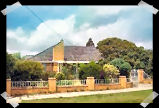 Australian comedian Barry Humphries' humour identified and targeted a world of pleasant streets and gardens that is now under threat. We've stopped laughing, but is it too late?
Australian comedian Barry Humphries' humour identified and targeted a world of pleasant streets and gardens that is now under threat. We've stopped laughing, but is it too late?
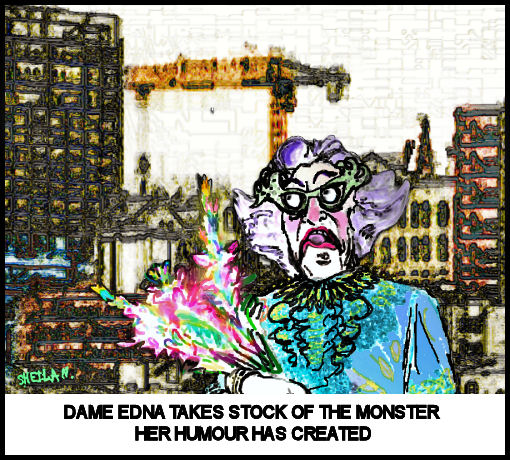
I was raised on the humour of Australian comedian, Barry Humphries, when his main alter ego was the suburban sage simply known as "Mrs Edna Everage” and his eastern suburbs commentary issued forth in the monotonous narrow viewed but well-meaning drone of Mr. Sandy Stone. Barry’s characters described a world which was very familiar to me, although I lived in neither the now famous Moonee Ponds nor in the apparent epitome of Melbourne mediocrity, Glen Iris. The adults in my family all found the Humphries humour hilarious, despite, or maybe because of the fact that their lives were being held up to good humoured ridicule. I shared this delight and amusement with them.
Barry Humphries' targets were mediocre, commonplace and rather petty preoccupations such as lawn mowing, sandwich making, wall colour, general domestic decor and associated status symbols. It was all so familiar and we laughed our heads off all the more, delighted to be laughing at ourselves and our nearest and dearest. Or if it wasn’t us it was someone we knew. The humour rested on an assumption of self- satisfied comfort and safety, devoid of outside threat. Our laughter and Barry’s merciless assault is an indication of how quickly we forget and how short each stage of our lives really is. Barry was born in 1934, safely clear of any expectation of participation in WW2 or The Vietnam War. He emerged as an adult in the postwar comfort and optimism of the 1950s and played to an audience where young couples were settling into their suburban Shangri -la’s. "The Australian dream” of the house and garden was alive and well and not under any threat. This situation continued for a few more decades but on a downward trajectory in terms of general accessibility, that is to say, affordability.
Fast forward to the present day and what was once a source of relaxation, pleasure, security and comedy, the suburban family home, is now turning into a tragedy.
The undermining of the family home and garden in concept and reality has been under way for at least 30 years. It began with soft rumbles, the odd newspaper opinion piece advocating the end of the 1/4 acre block and the beginning of a rhetoric very negative and critical of the way we lived. People started to parrot these opinion pieces and preach knowingly at dinner parties, that we couldn’t go on living as we were as though cleverly seeing into the future. Then they would go home and continue living as they were, no doubt thinking that it was people in the future who would have to live differently, not they. The point was that they did not express any feeling of being under threat. Yet they were. They are!
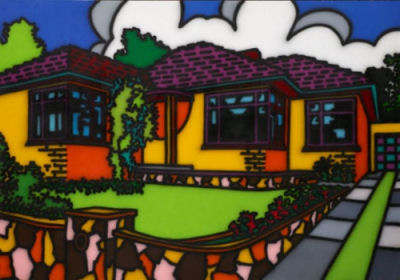
The sacred, yet hilarious homes of our parents and of us are now being demolished, at a frightening rate. The honest workmanship of the Californian Bungalo and the 50s triple fronted cream brick veneers is being replaced with nondescript non- architectural multi dwelling, fence to fence arrangements , devoid of of any reference to the humanity of those who are expected to dwell within. The subject of Barry’s whole comedy career is being pulled down in front of us; a new cavernous car park excavation appearing near where I live each week. That is the reality on the ground. In the media , a past Victorian Planning Minister, Justin Madden who now works for developers was given space for a whole article about the need and desirability, nay imperative, of demolishing 60 year old houses in a ring of Melbourne suburbs about 15 kms from the CBD. There’s always a new angle in the scramble to fit ever more residents into Melbourne (which grows by about 80,000 people p.a.) Developers who can get their hands on these unsuspecting little houses on their “1/4 acre" blocks (I understand they never were as large as 1/4 acre, really) can make a killing by demolishing and redeveloping to fit in more residences.
It seems to me that people are now really getting upset by all this. They see their local neighbourhoods in a constant state of transformation. They are living perpetually in a construction zone. Trees, houses and gardens go, roadworks and construction abound and there is the constant shock of empty blocks of land either totally cleared and levelled or exposing raw bedrock 3 metres deep, previously covered with a few tonnes of earth and rocks and iced with pleasant house and garden.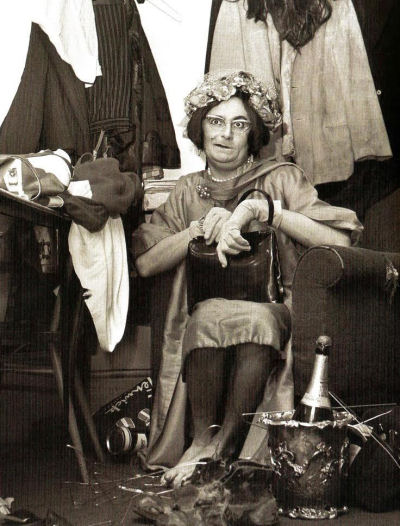
But what has this to do with Barry Humphries? Well for a start, the much derided but rather enviable and almost egalitarian Melbourne suburban way of life is swirling down the plug hole and will be gone before you know it. The people of Melbourne did very little to protect it when it was first under fire and now it is probably too late. Were we asleep at the wheel? Did Barry Humphries unwittingly lull us into a child-like sense of security about our home city?
What does Barry say now when, in actual fact what is happening is that our precious gardens are being used to accommodate an ever higher population? Had we been asked 15 or 20 years ago if we minded someone building in our backyard, we would have said, “go and find you own land!” but that is what we are being forced to do now. People move out of garden-surrounded houses into units with token amounts of land and end up with only a little bit of change from the exchange. Collectively, what is happening is that others are building in our gardens!
Barry Humphries’ jokes about the scourge of thrip on the roses (or was it the tomatoes?) will be incomprehensible to future Melbournians. How can this joke be funny when the “problem” is foreign to you?
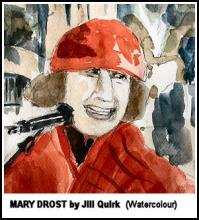 Mary Drost's 90th birthday party took place on 13 October 2021, while Melbourne was still in Lockdown, but you could meet in the open air if you wore masks and were within 20km of your home. I was unable to attend because it was out of my 20km range.
Mary Drost's 90th birthday party took place on 13 October 2021, while Melbourne was still in Lockdown, but you could meet in the open air if you wore masks and were within 20km of your home. I was unable to attend because it was out of my 20km range.

 Australian comedian Barry Humphries' humour identified and targeted a world of pleasant streets and gardens that is now under threat. We've stopped laughing, but is it too late?
Australian comedian Barry Humphries' humour identified and targeted a world of pleasant streets and gardens that is now under threat. We've stopped laughing, but is it too late?


Recent comments